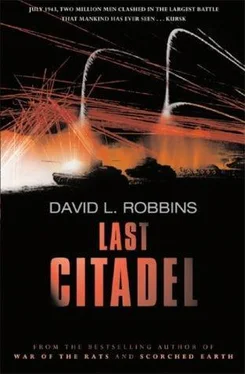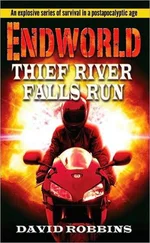‘Please?’ Plokhoi repeated from high above the peasant.
The elder clutched his hat now, stopping his hands. He spoke but could not raise his head to answer, as if Plokhoi’s boot were on it.
‘Sir. The Germans. They’ve…’ and the old man quit.
‘They’ve what?’ Plokhoi demanded over the elder’s bowed head to the rest of the village. ‘The Germans have what? Have they been such good masters to you in the two years they’ve occupied your land that you won’t rise against them now?’
Plokhoi slung his legs down from the saddle. He walked away from the horse, leaving it untethered, and the animal stood still. He strode to the middle ground between the villagers and the mounted partisans. He lifted both arms.
‘We greeted the Germans, didn’t we all? We met them with bread and salt. They were supposed to be our liberators from Stalin and his henchmen, they were the ones to set us free from the tyranny of the Communists. Hitler couldn’t be worse than Stalin, we said. We were all hopeful.’
Plokhoi lowered his hands. He nodded to the people.
‘I was, I know. I hated Stalin. I saw the steppe fill with the graves of starved women and children, next to wheat fields that should have fed them. I watched comrades be jailed, exiled, or shot for raising their voices against the repressions. So I was first in line when the Germans came. I waved my arms in the air.’
He walked past the starosta to an old woman. Flesh hung from her face, in the quarter light of the night Katya could see her hunger. Her neighbors stepped away from her now that the partisan came close.
Plokhoi reached for her hand. ‘How many of your men have the Nazis taken, mother?’
The woman lowered her chin, but with his free hand, Plokhoi lifted her face to his.
‘How many, mother?’
‘Half.’
‘Half your men.’
‘Yes.’
‘I’ve lost half my men, too, mother. Should I tell you about it? They were left beside a railroad mound, unburied, to rot like cabbage.’
Plokhoi held the old woman’s hand for a long moment, then let her loose gently. He stepped back to address the villagers.
‘Your men, the ones the Nazis took. They were executed. Two of your men for every one of theirs killed by the partisans. I know this. I’ve seen the bodies hung outside this village. I’ve seen it in other villages, too. You were ordered by the occupation police to let them hang for two weeks before you could cut them down and bury them. Two weeks!’
Katya imagined the gallows of corpses dangling in the middle of this little collection of pastel houses, the people shuffling past their husbands, brothers, cousins, friends, watching them turn blue-black and crow-pecked. She saw the bodies piled beside a railroad. Her mouth went dry.
Plokhoi raised his voice.
‘And others. They were taken to Germany as slaves. I know this, too. I was captured from my home in Poltava. My brother, as well. But I escaped. My brother’s in Germany somewhere, starving worse than you, beaten every day, spit on. Instead of a gun, he carries German slop buckets.’ He unstrapped his carbine and with one hand he hoisted it over his head.
‘I carry the gun.’
He held the rifle high for several seconds, a statue of dark resistance; in Katya’s mind he stood beside the gallows, defying it, equaling it. Then with a clatter he lowered the gun and strapped it back over his shoulder.
‘So will you.’
Silence descended in the village, broken only by a shifting horse, a squeak from a saddle.
The starosta linked his knotty hands in front of his face. He held them up to Colonel Bad, as a counterweight to the gun, a prayer perhaps to equal the partisan’s command.
‘Please,’ the old man said again. ‘I ask you to let us alone. My people have…’
So much was on the old man’s tongue. He wanted to tell all to this partisan gang come out of the darkness, all the stories of his village’s sufferings. But Katya knew Plokhoi would not be moved by suffering. And the starosta knew this, too, for all he could say was ‘I beg you, please go away.’
‘No, father. That is something I cannot do.’
Plokhoi pivoted to his waiting horse. He stepped into the stirrup and mounted, rising again above the peasants and their plea.
‘Ten of you. Get your horses and come with us. Now.’
No one moved. Plokhoi sighed and shook his head. He doffed his cloth cap and ran a hand through his hair. A bead of sweat trickled down Katya’s back. Artillery thunder from the north filled the moments until Plokhoi returned his hat to his head and spoke.
‘Father.’ The partisan folded both hands over his saddle horn. ‘Which is your home?’
The starosta pressed his hat closer to his chest. He hung his bare head.
‘Go to it,’ Plokhoi told him, ‘and bring me all your food.’
The elder did not move.
‘Old man. I will pick a house.’
At this, a woman in the crowd bolted up the street with a swish of skirt. She was the elder’s wife, sister, it didn’t matter, she obeyed when her man would not. Nothing moved in the minutes while she was gone but the jittery horizon.
Katya watched Plokhoi and his band glare down on the villagers. Plokhoi wanted to save these people, and to do this he would hurt them. Three years ago, Plokhoi had chosen Hitler over Stalin, until the one became an even greater monster than the other. Tonight the villagers chose, between the German invaders and these looming, dangerous partisans. None of the choices for Plokhoi or these peasants had come to them with mercy.
If Leonid had been saved by these partisans instead of her, would he sit here on a horse and watch like she was? Or would Leonid speak up to defend the old village, to ask that they be left alone as they pled? She tried to imagine Leonid blank-faced and grimy, one of Plokhoi’s men, she tried to imagine him cruel, and could not.
Carrying a woven basket, the old woman ran back up the street. Now, breathing hard, she offered up the basket to the partisan leader. Another partisan rode forward to take the food. Katya saw a few loaves and leafy vegetables, a pittance of victuals to fill the stomachs of a household. Plokhoi did not acknowledge the basket or the woman. She looked surprised, then frightened. Plokhoi rode away from the crowd and his motionless cadre to a nearby barn. He dismounted, took a square bale of straw, then walked along the dark street where the woman had gone.
Moments later, the windows of a house began to flicker. Plokhoi emerged from it and walked back to his horse. He climbed into the saddle, carrying something. He rode forward. The house behind him glowed brighter until it was clear the lapping light was flame. Plokhoi rode up to the starosta and handed down to him a lantern out of his little house. The lamp was unlit and, Katya knew, drained of fuel.
The elder and the crowd did not know what to do. Heads turned to the burning house, then crept back to the partisan on the tall horse gazing down on them. The old man slipped his hat back on his head. His role as leader for the village was over. He stepped away from Plokhoi. No one spoke to him or touched him. The woman stood rooted in the street where she had handed up her basket, hiding her face in her hands, sobbing beneath the crackle of burning wood.
Plokhoi’s demand rose above the fire and the murmuring villagers.
‘Ten men! On horses!’
The elder did not raise his head to select the men. Katya couldn’t tell if his burden was loss or shame. Again, it didn’t matter; neither had come to him mercifully.
The men from the village chose themselves. More than ten of them assembled in the street on horseback. Three were told by the others to stay behind, with muttered instructions of care for the women and the work to be done in the village with ten fewer backs tomorrow. The burning house collapsed on itself, spewing sparks and smoke high while the men gathered and said goodbye. The new riders hurried, Plokhoi didn’t have to say a word to them. When they were ready and lined up, Katya saw the resolve on their faces. They’ll hate Plokhoi, she thought, but they’ll fight the Nazis. These old men will get the chance to die not as foreign slaves, not strung up as reprisals, but fighting. They have been given the chance to live. That was the choice Katya herself made when she joined the war as a Night Witch, and again when she decided to stay with the partisans.
Читать дальше












